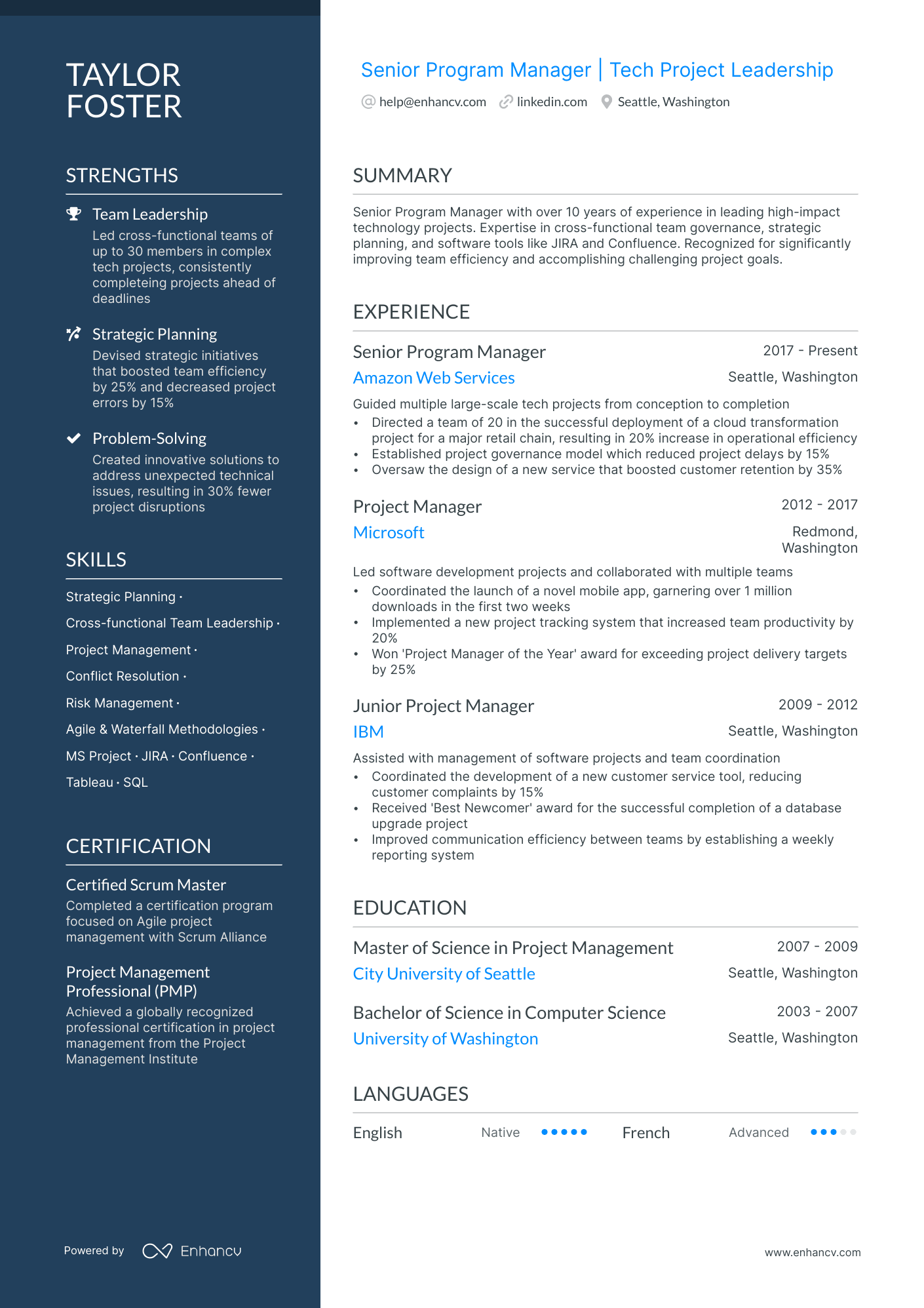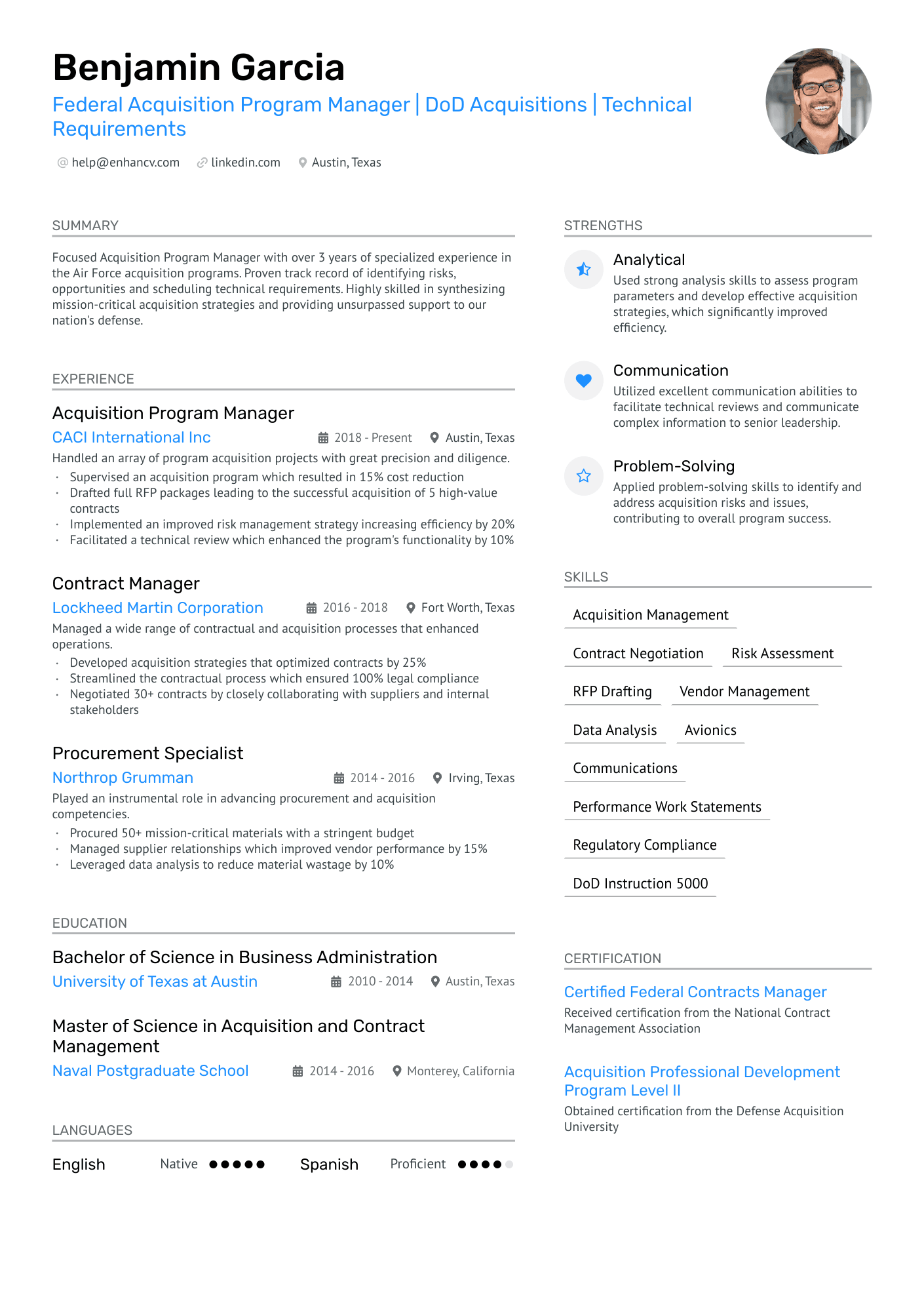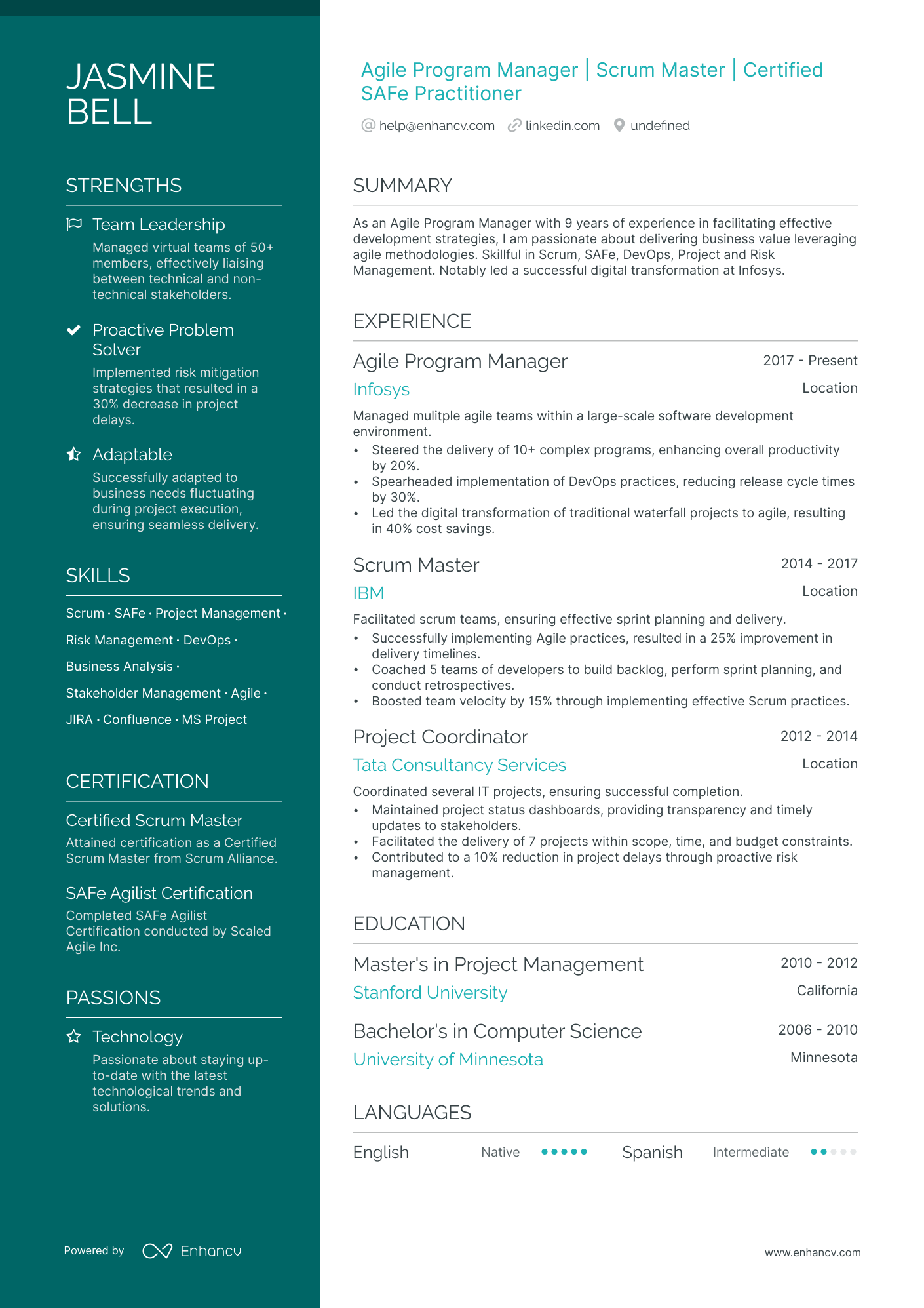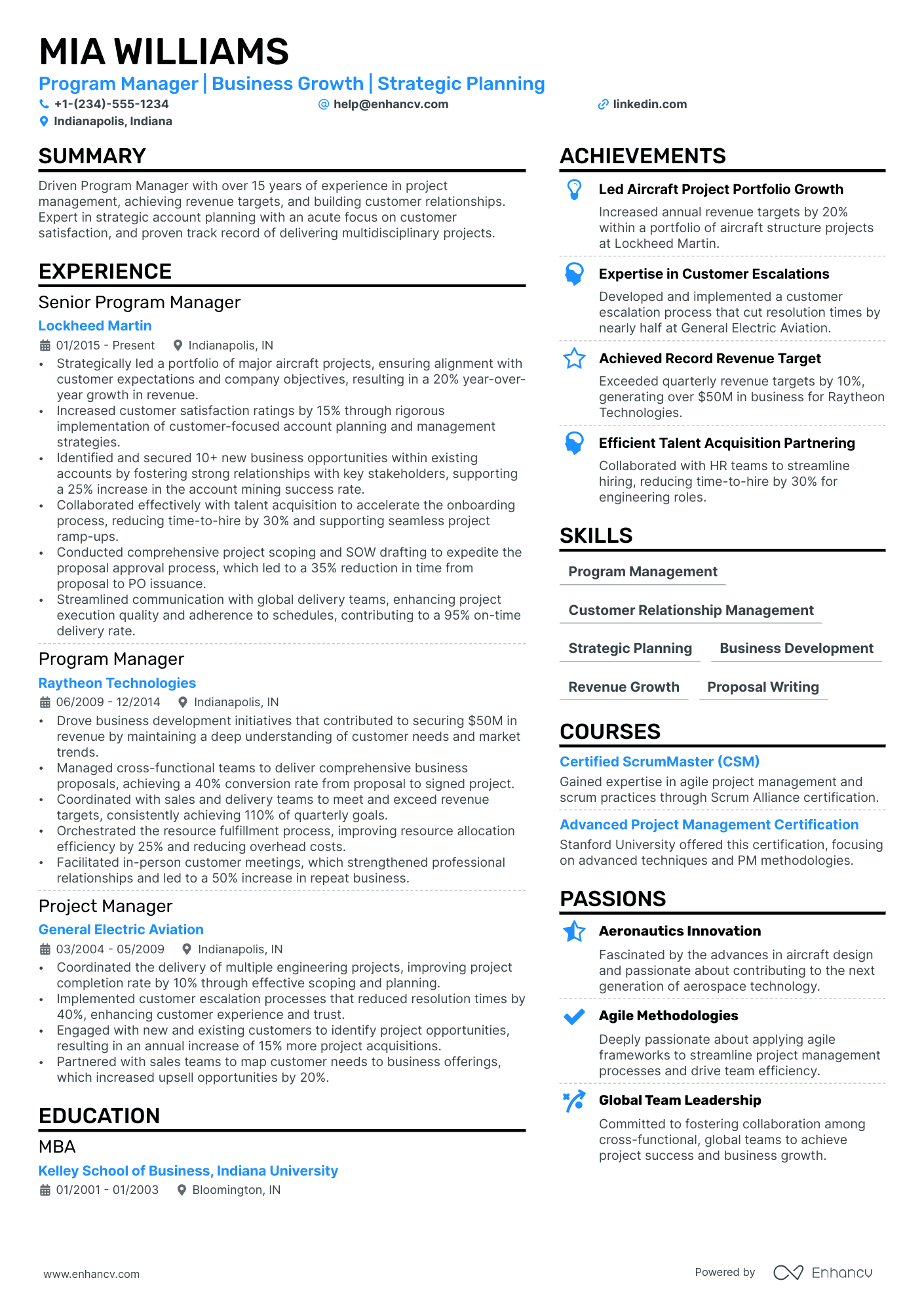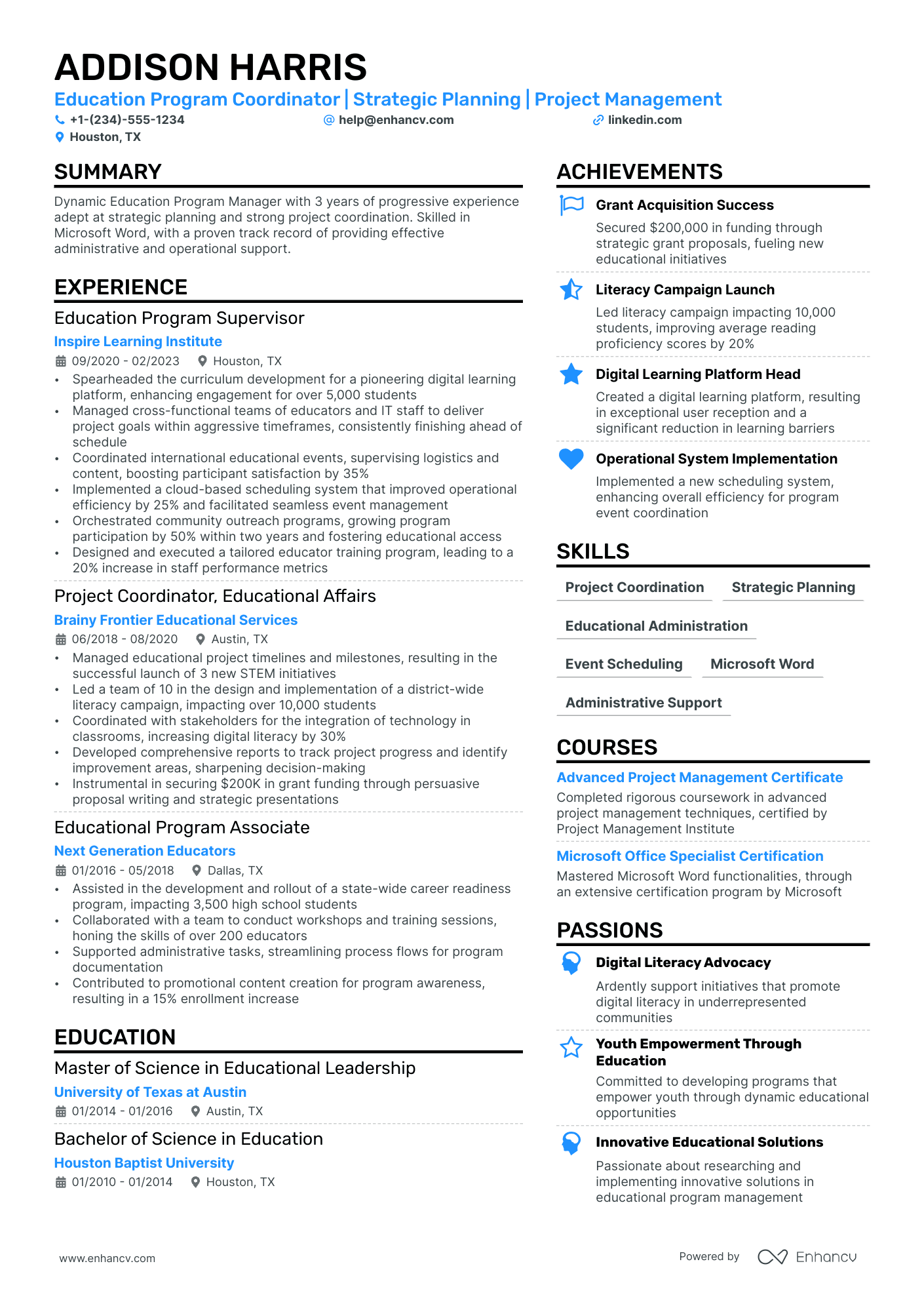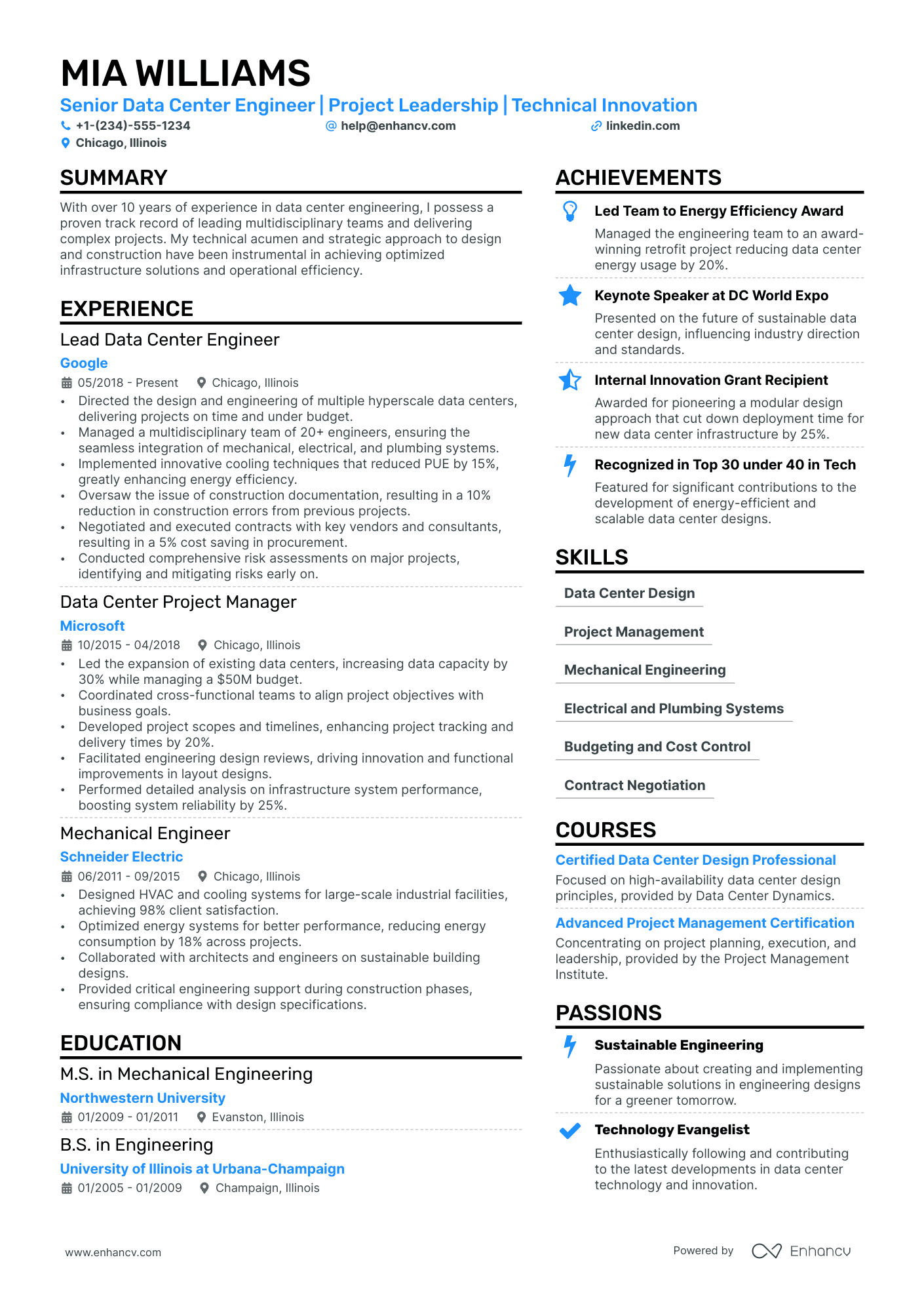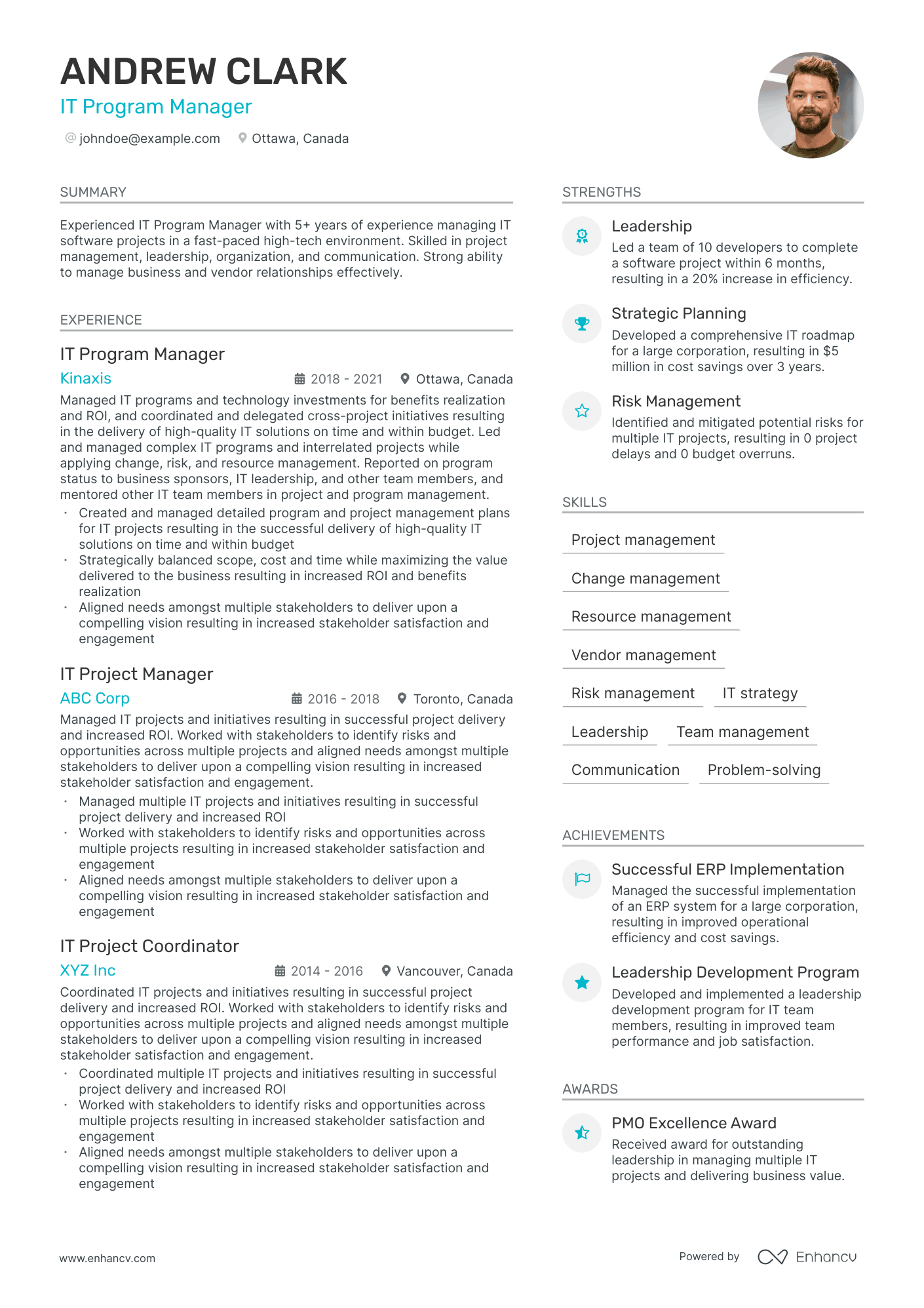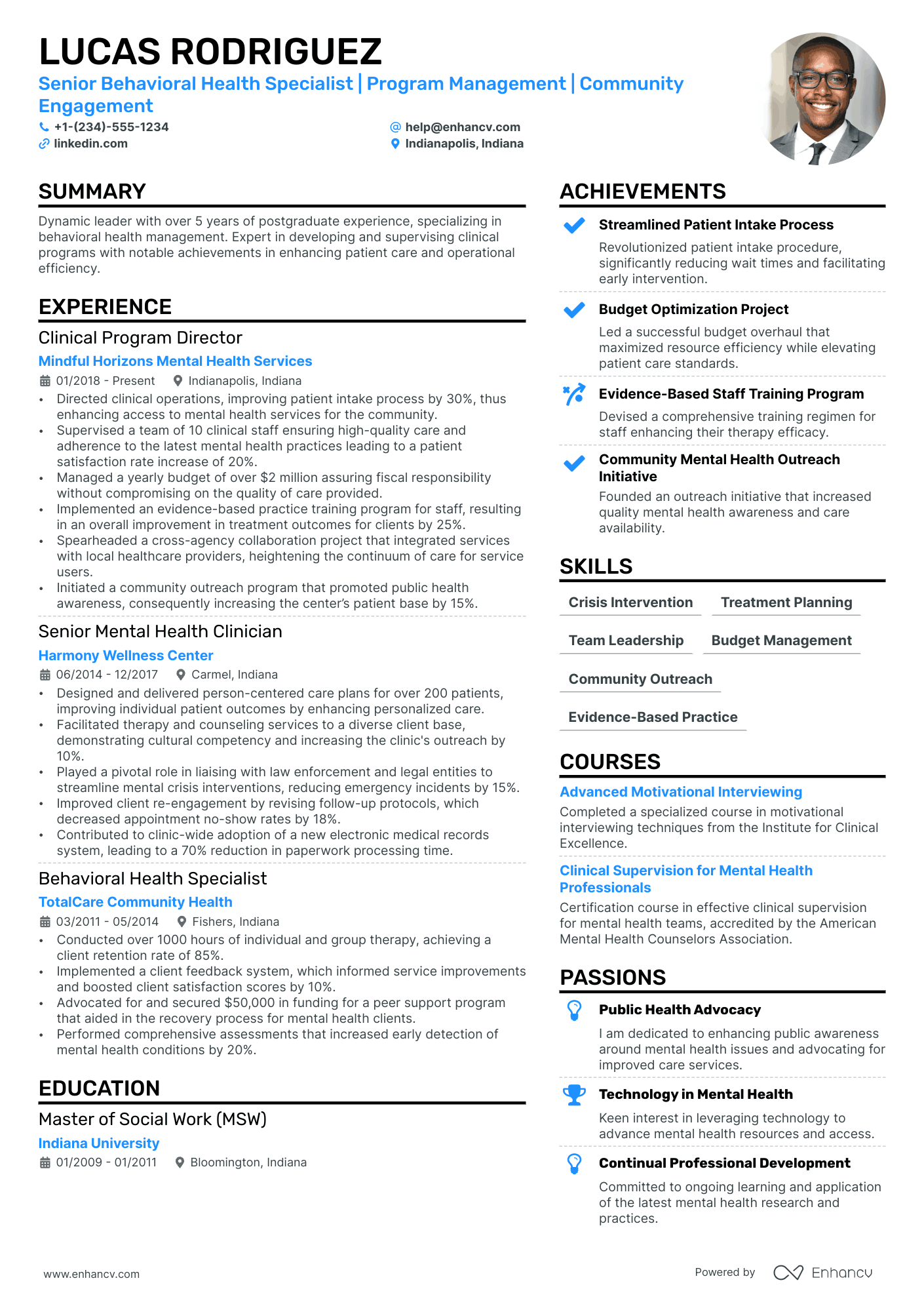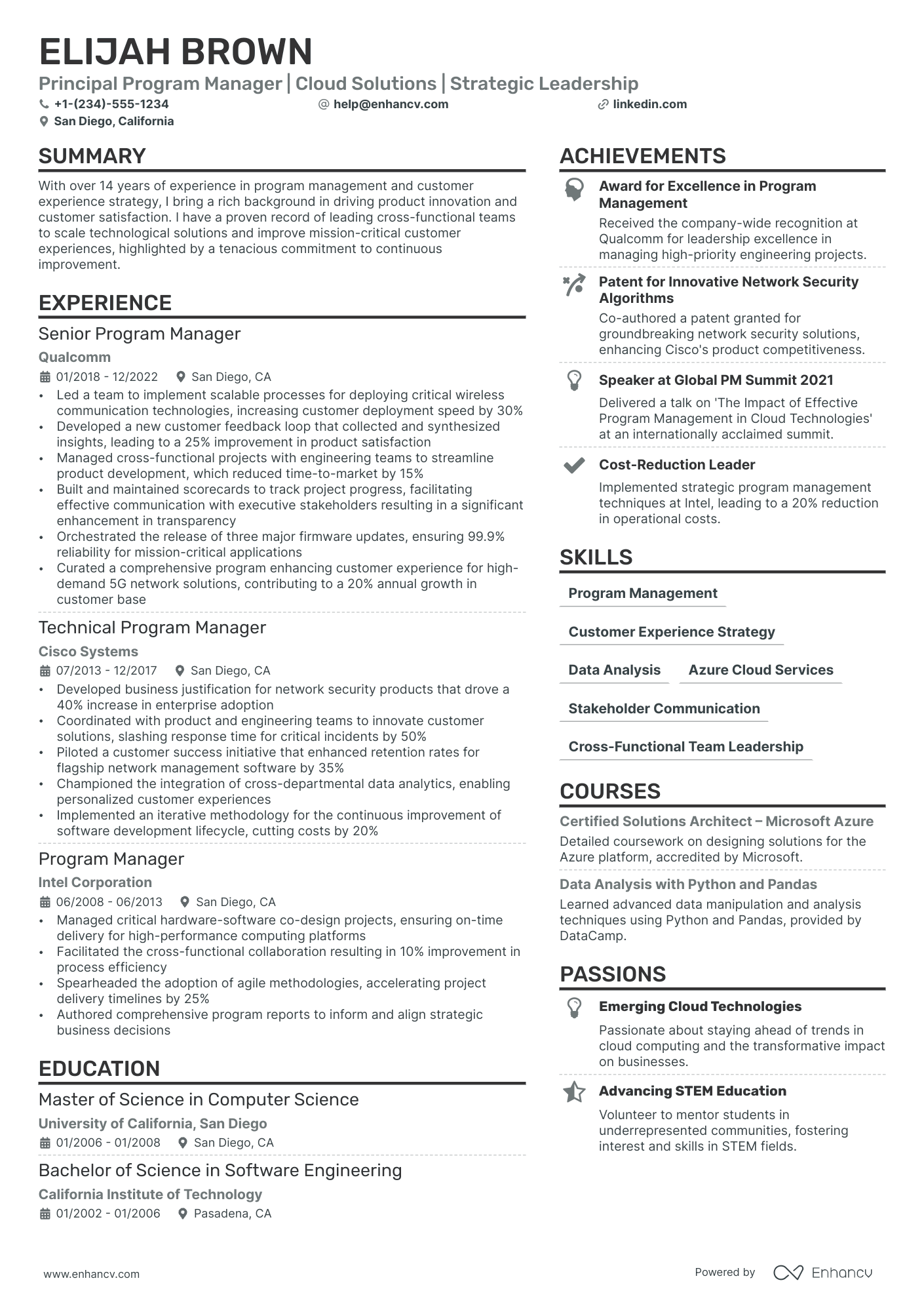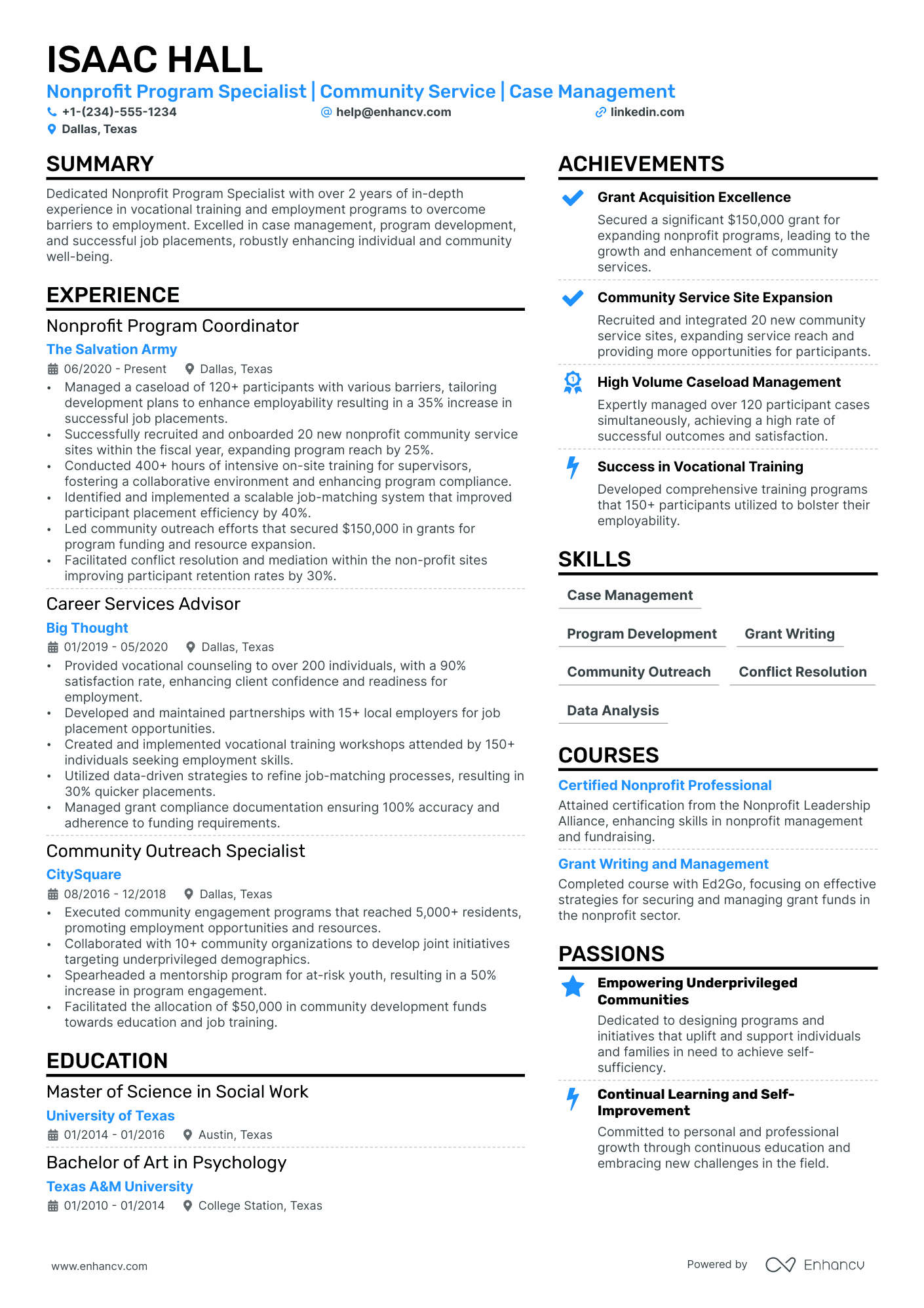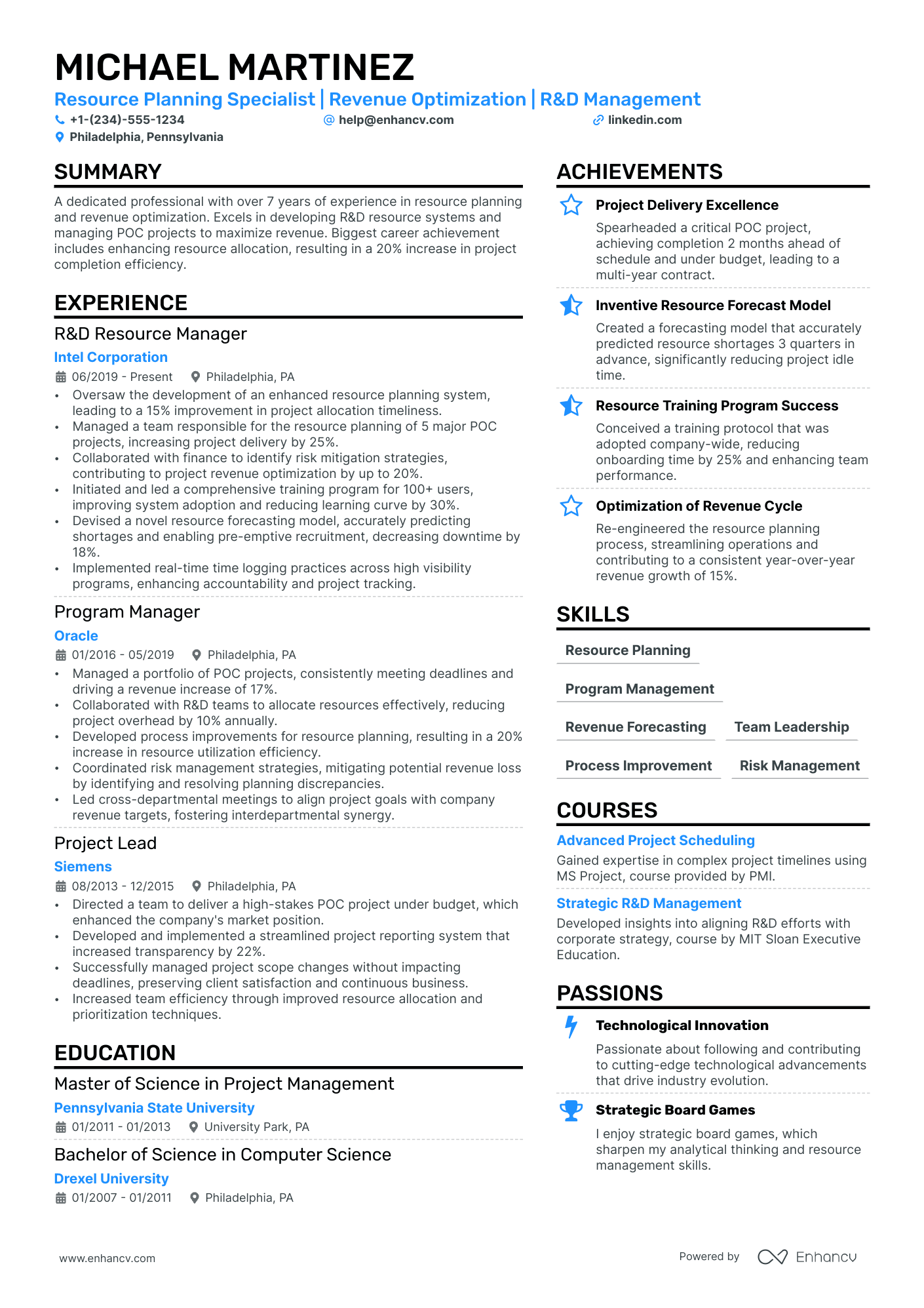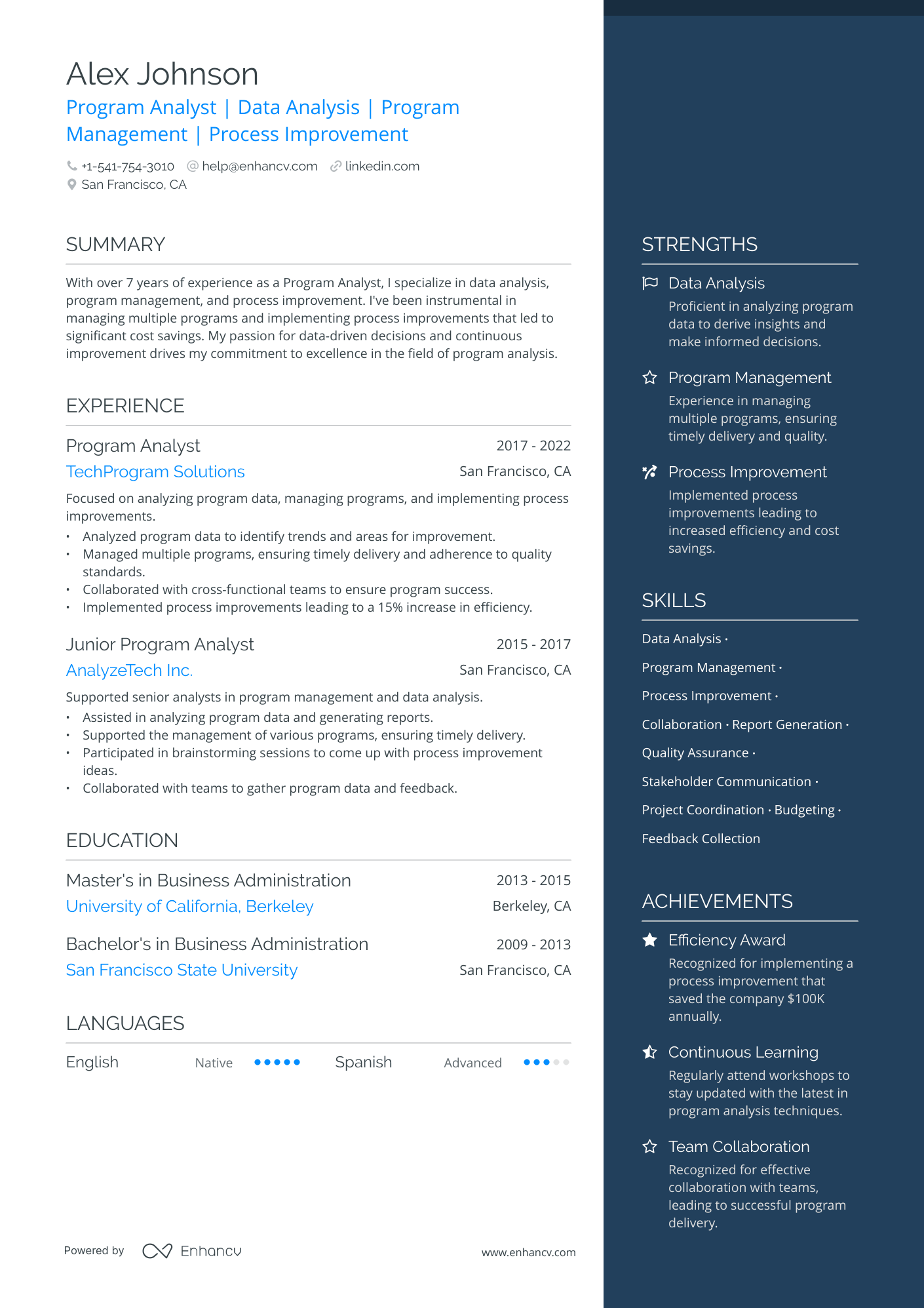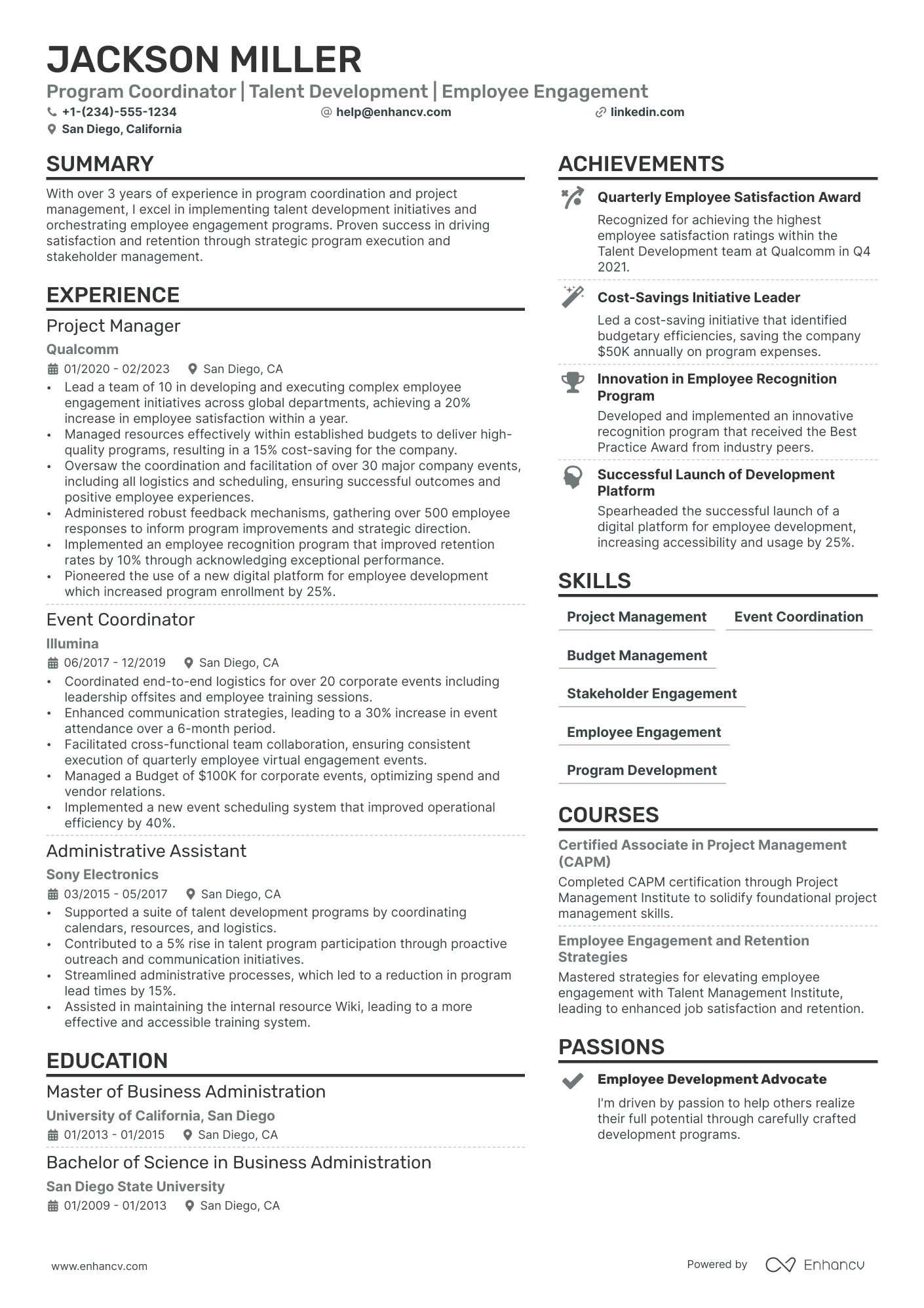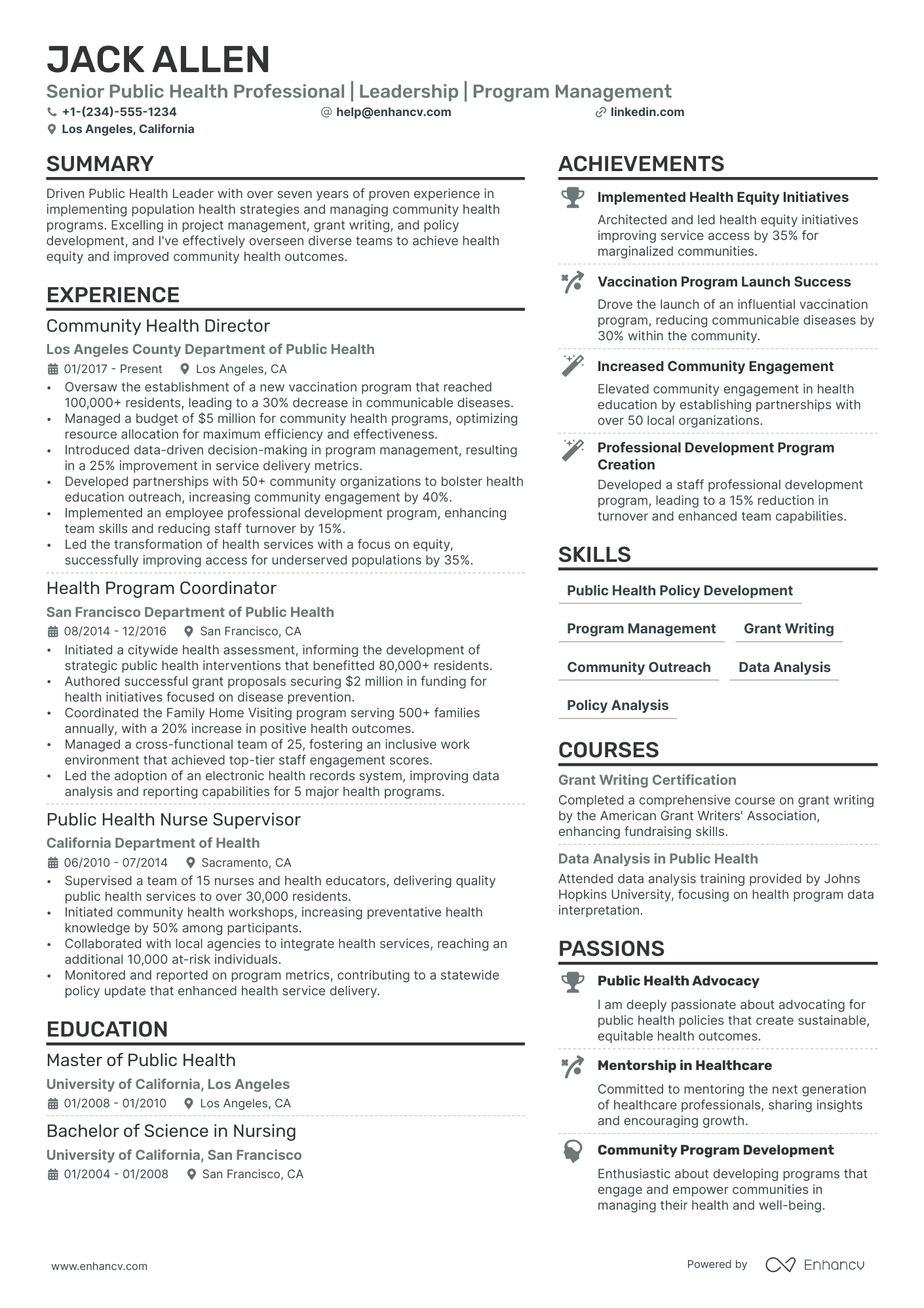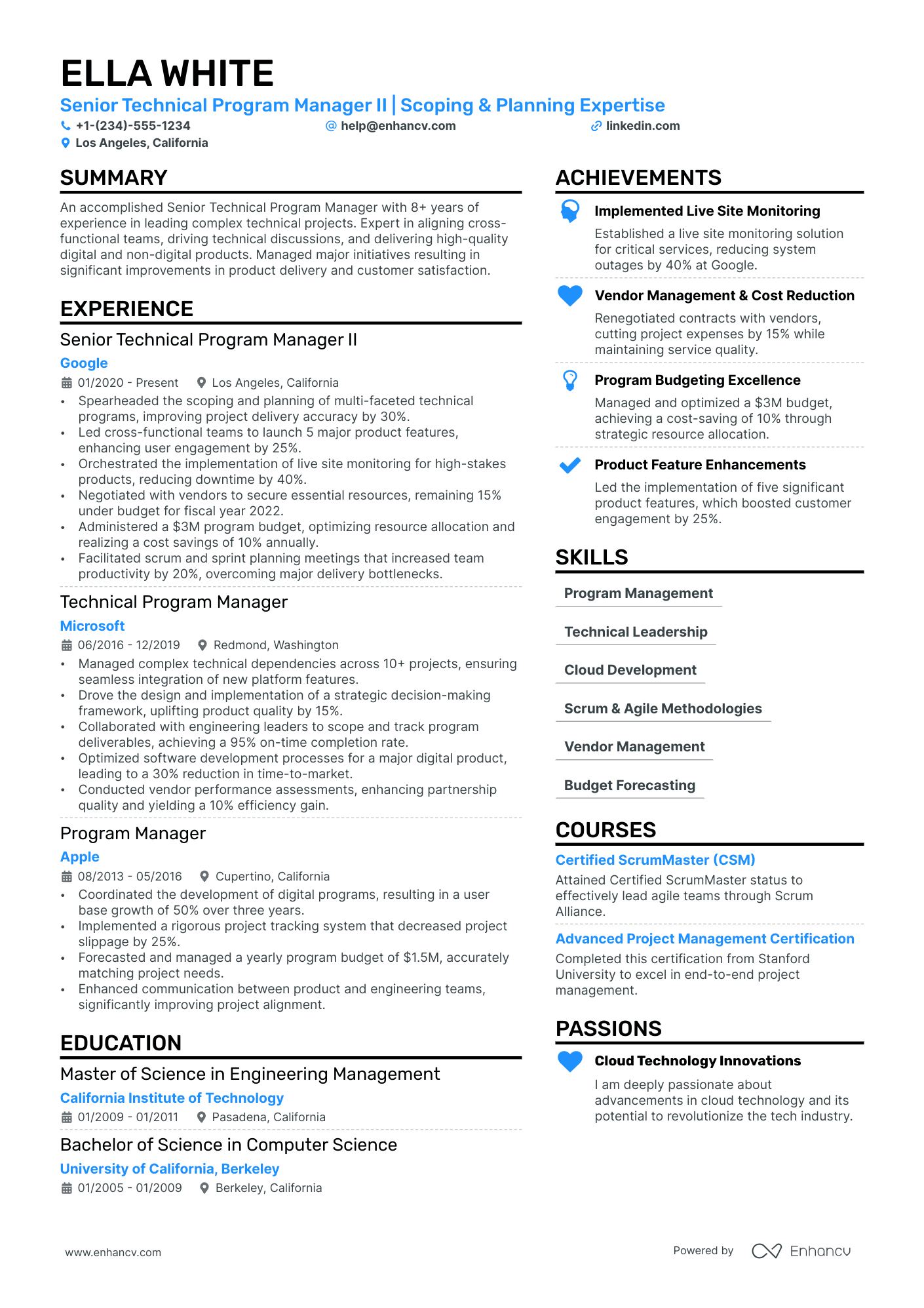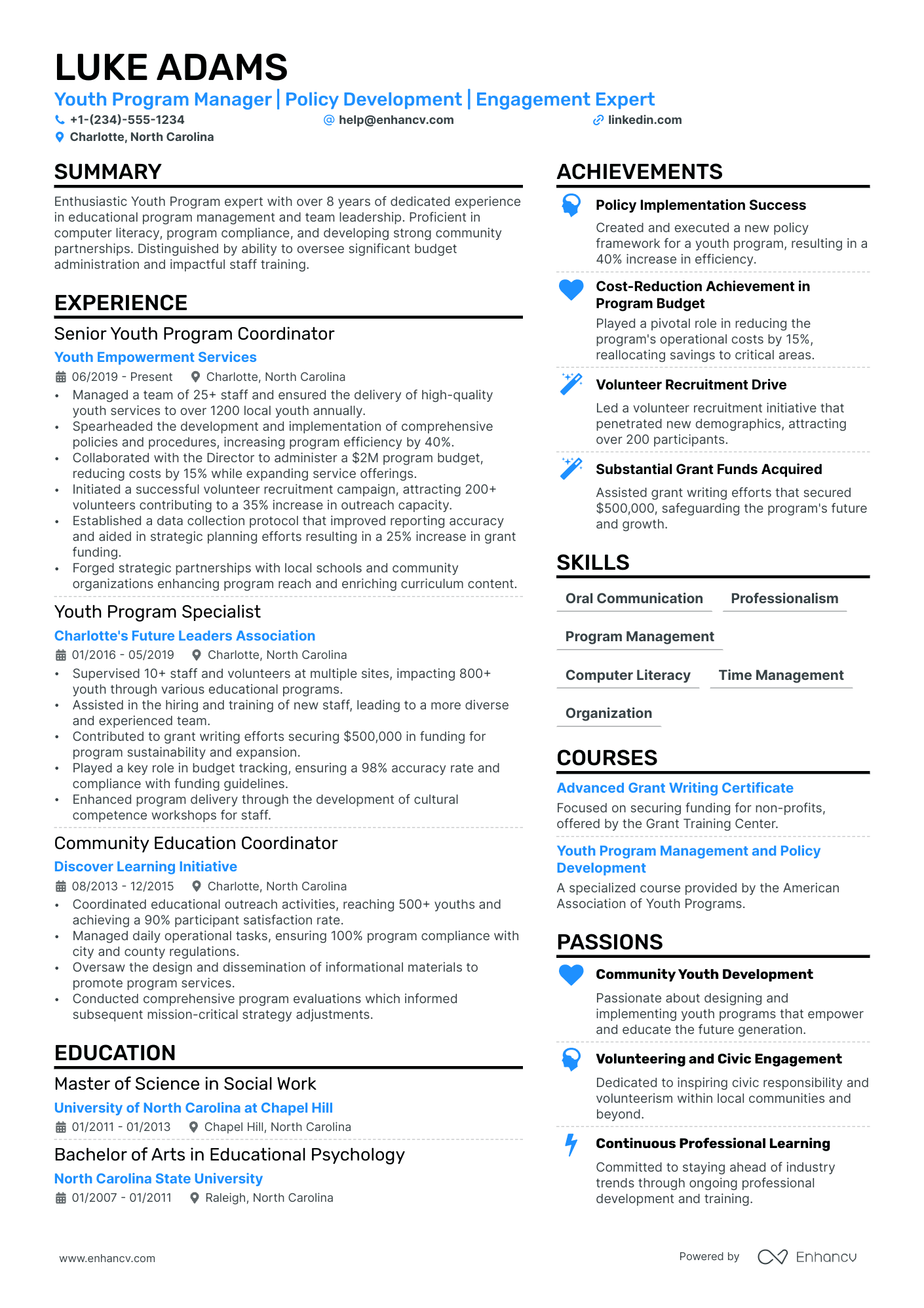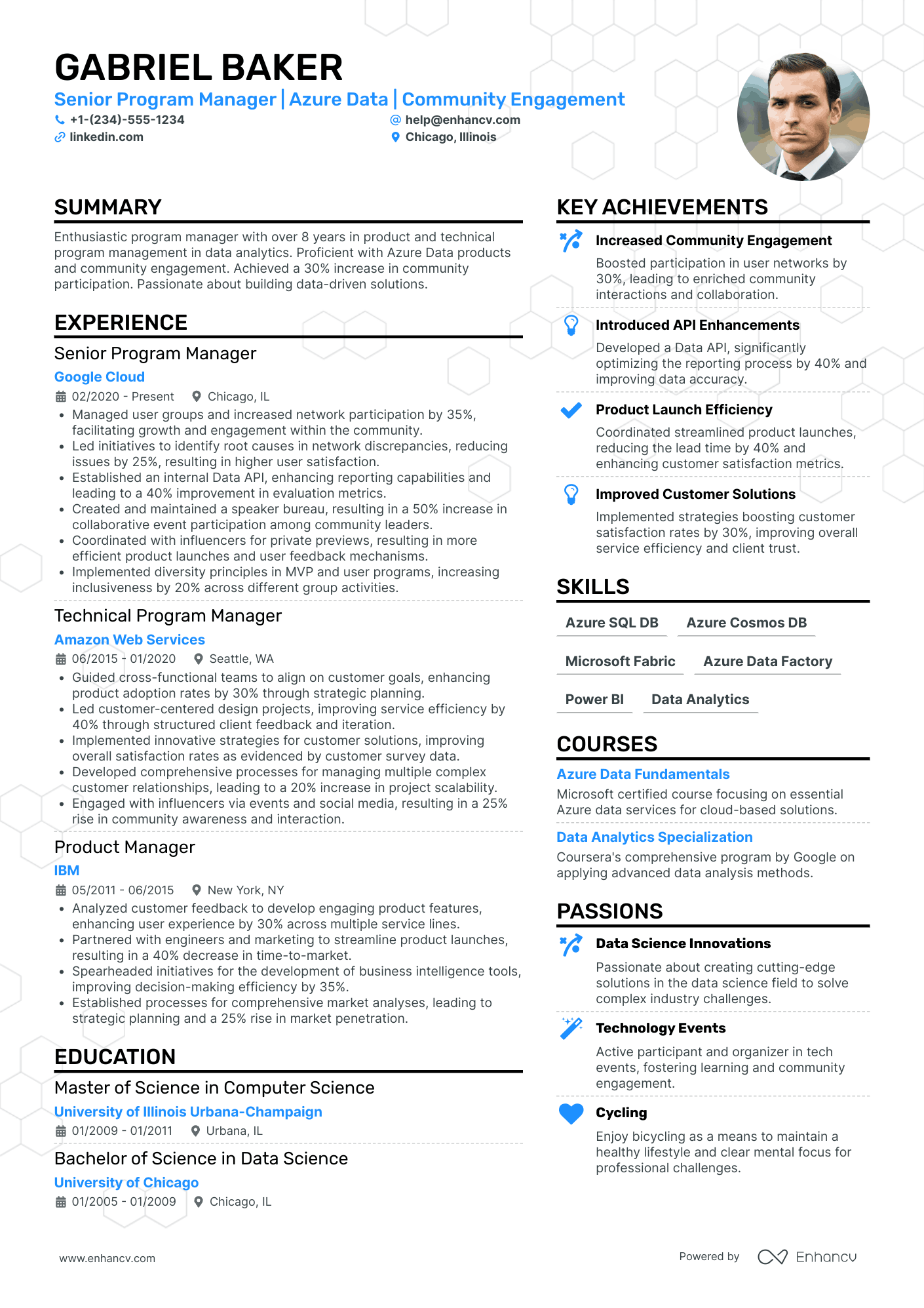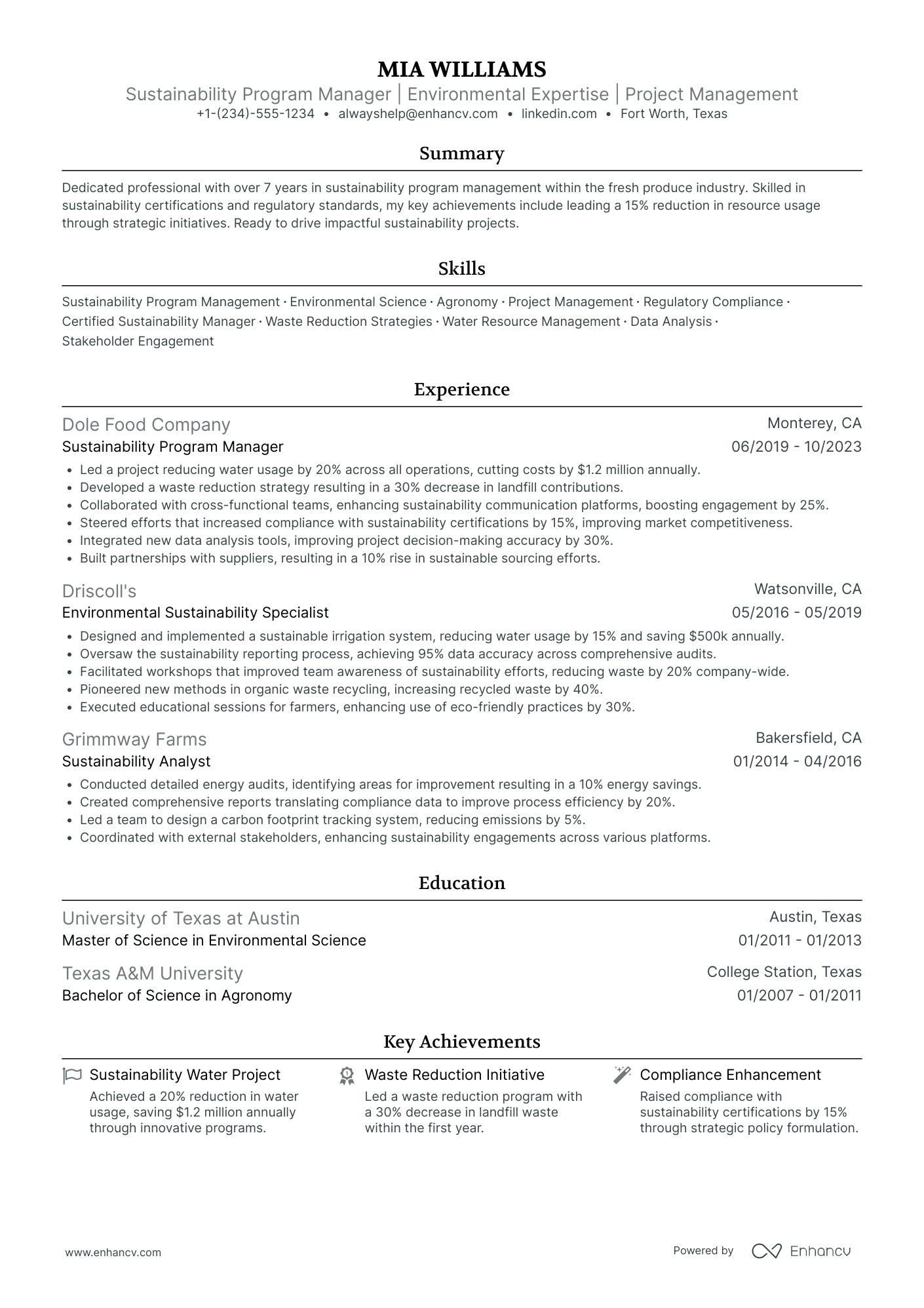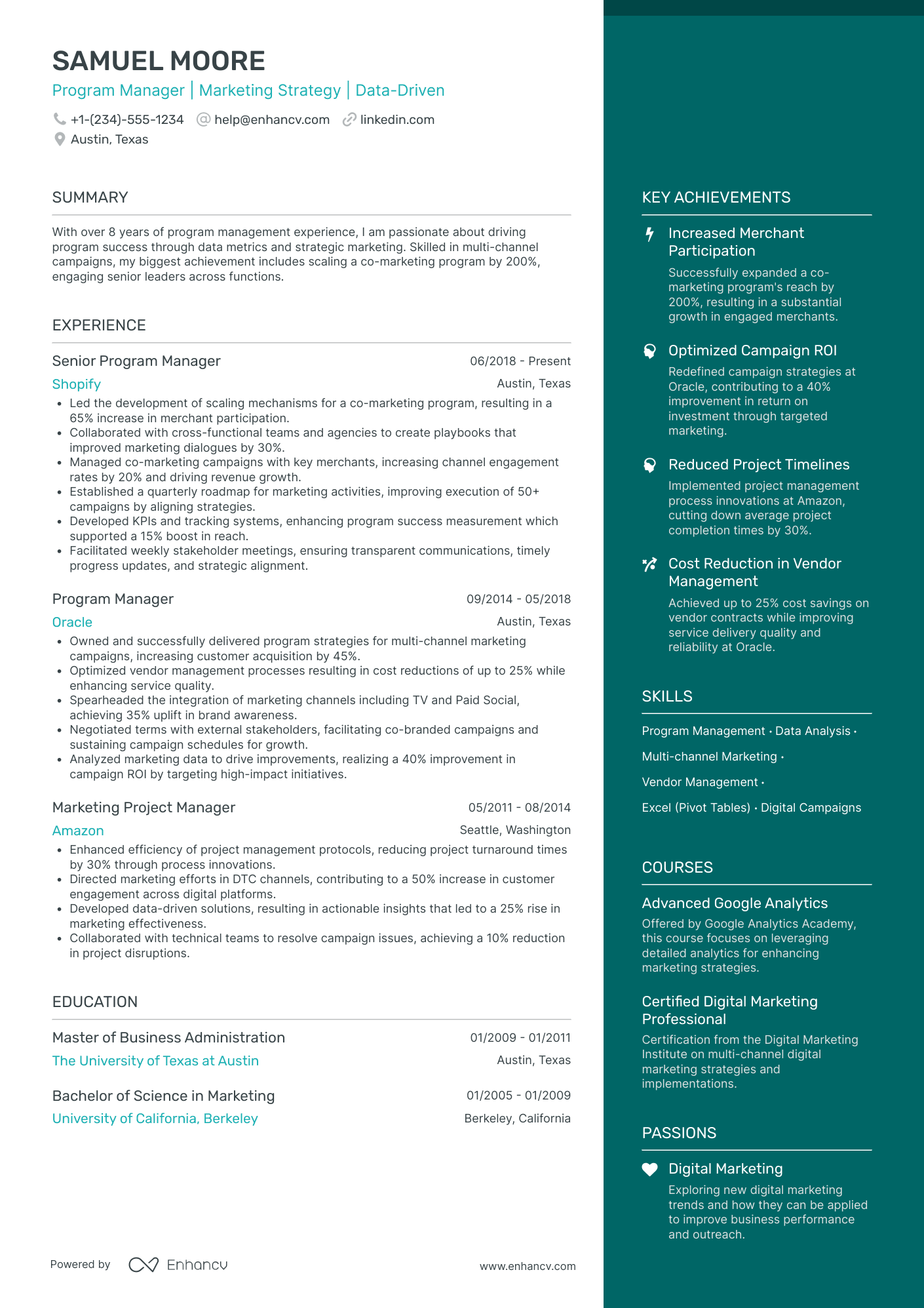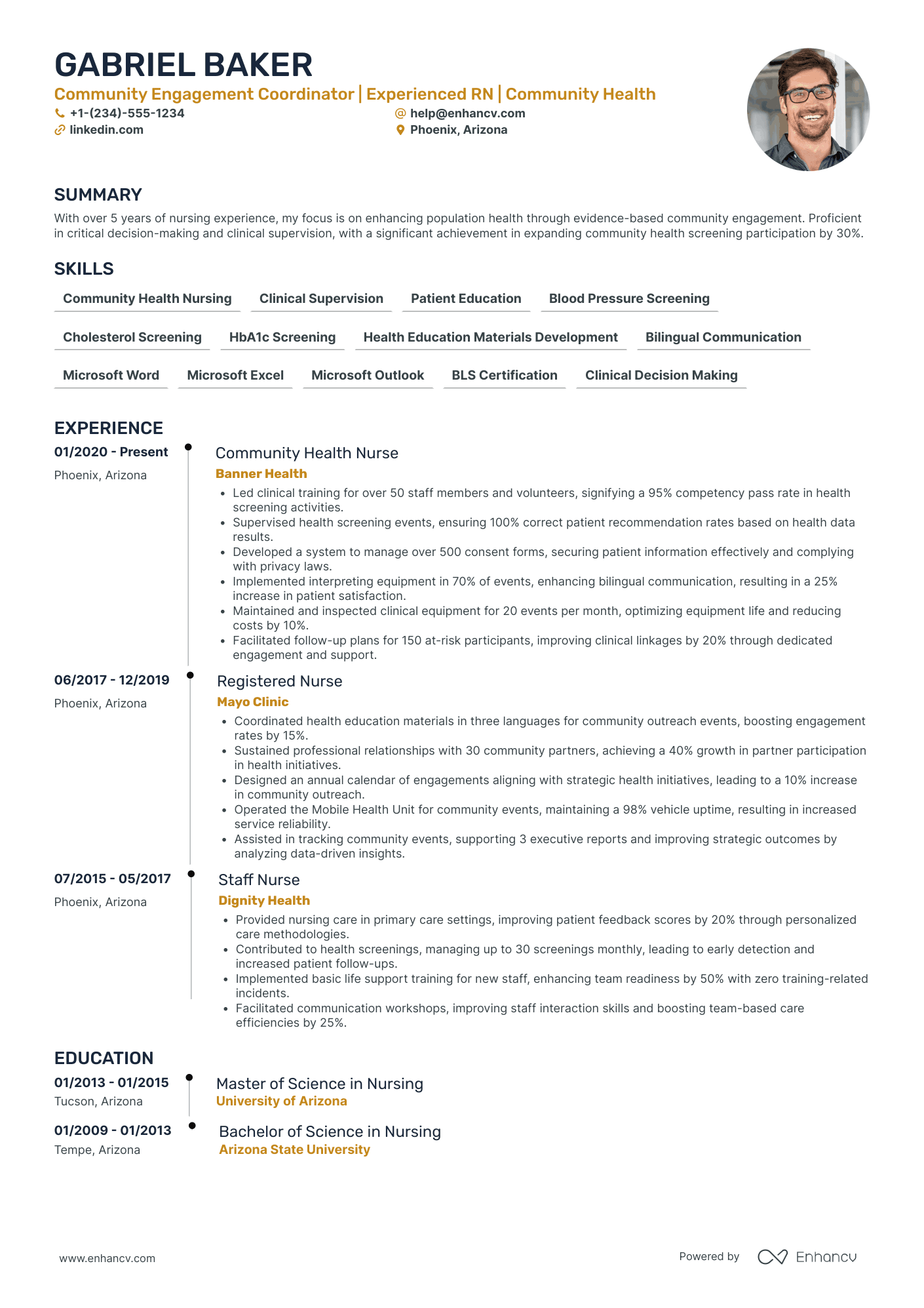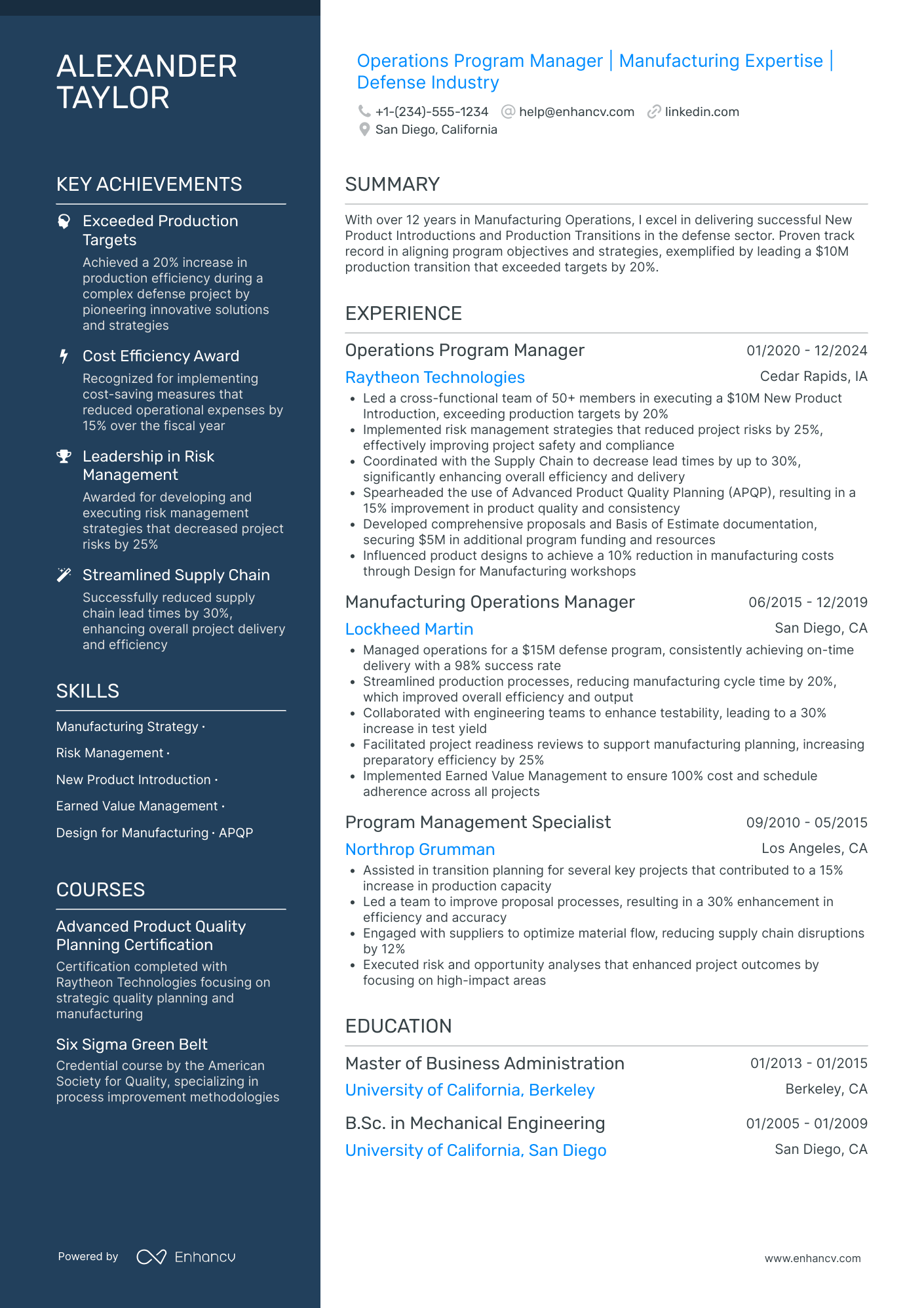A program manager’s resume needs to impress two people right off the bat: the recruiter who’ll pre-screen your resume and the Vice President or Director they’ll report to when hired.
The challenge is, that some companies use project managers and program manager titles interchangeably. You may be a project manager now but to another company (or industry) your skills might be for the project level only.
Semantics and corporate structures aside, about 25 million program managers are needed worldwide just to keep up with demand by 2030.
The application process is just a headache. How can your resume pass the Applicant Tracking System (ATS) if the hierarchies, job titles, and tasks vary everywhere?
Like any management job, there’s a way to work the system.
In this guide, you’ll learn:
- How to write quantifiable metrics and achievements without bombarding your program manager experience with details
- The difference between good and bad program manager resume examples
- How to strategically list the multitude of skills, apps, and certificates you have
- How to write a program manager resume with no experience, especially if you’re switching from another role like product or project management.
If you’re not sure if this is the right fit for your experience and career trajectory, check out the additional guides we have for similar roles:
Program Manager resume examples
By Experience
Senior Program Manager
By Role
Acquisition Program Manager
Agile Program Manager
Aerospace Program Manager
Education Program Manager
Engineering Program Manager
IT Program Manager
Mental Health Program Manager
Microsoft Program Manager
Nonprofit Program Manager
Principal Program Manager
Program Analyst
Program Coordinator
Public Health Program Manager
Technical Program Manager
Youth Program Manager
Senior Program Manager
- Clear Content Structure and Presentation - This resume is meticulously organized, providing a clear hierarchy of information that makes it easy for readers to quickly grasp the candidate's qualifications and career trajectory. The use of bullet points and consistent formatting across sections enhances readability and maintains clarity throughout.
- Career Trajectory Reflects Growth and Versatility - Gabriel Baker's career progression from Product Manager at IBM to Senior Program Manager at Google Cloud indicates a robust career trajectory that includes significant promotions and shifts across major tech companies. This growth underscores his ability to adapt and excel in different environments within the technology industry.
- Unique Technical Depth in Azure Data Tools - The resume highlights extensive expertise in Azure Data products, including tools like Azure SQL DB and Azure Data Factory. This knowledge, combined with specific achievements, demonstrates Gabriel's ability to leverage technical tools to drive impactful business solutions and community engagement.
Sustainability Program Manager
- Structured presentation for clarity - The resume is organized with clearly defined sections such as experience, education, skills, and achievements, making it easy for readers to navigate. The bullet points under each experience provide a concise and focused summary of responsibilities and contributions, which is essential for a quick review by recruiters.
- Consistent career growth in sustainability - Mia's career trajectory is impressive, depicting a steady advancement from a Sustainability Analyst to a Sustainability Program Manager. This progression highlights her dedication and growing expertise in the sustainability field, underscoring her capability to take on increasing responsibilities and leadership roles.
- Emphasis on impactful achievements - The resume not only lists Mia’s achievements but also details the substantial business impact they generated, such as saving $1.2 million annually through a water usage reduction project. This emphasis on the tangible benefits of her work demonstrates her ability to contribute significantly to company goals and resource efficiency.
Marketing Program Manager
- Clarity and Structure in Content Presentation - The resume is designed with clarity and an organized structure, which facilitates ease of reading. Each section is neatly categorized with clear headings, making it straightforward for hiring managers to locate key information. The use of bullet points for experience and achievements ensures that the content is concise and highlights significant accomplishments without overwhelming detail.
- Career Trajectory and Industry Growth - Samuel Moore's career trajectory illustrates a well-planned advancement in the field of program management and marketing. Beginning as a Marketing Project Manager at Amazon and advancing to a Senior Program Manager role at Shopify, the progression indicates growth in responsibility and expertise. His experience across notable companies like Oracle further showcases adaptability and industry recognition.
- Business-Relevant Achievements and Impact - The achievements listed on the resume are particularly notable for their direct impact on business success. Increasing merchant participation by 200% and enhancing program success measurement to boost reach by 15% are indicative of Samuel’s ability to drive growth and innovation. These metrics are presented in business terms, speaking directly to how his efforts contribute to company objectives.
Community Engagement Program Manager
- Structured Education and Training - Gabriel Baker's resume highlights a strong educational foundation with degrees from reputable institutions like the University of Arizona and Arizona State University. The inclusion of professional courses such as "Effective Communication in Healthcare" demonstrates an ongoing commitment to developing necessary skills for healthcare environments.
- Demonstrated Career Progression - The resume showcases a clear career trajectory from Staff Nurse at Dignity Health to Community Health Nurse at Banner Health, culminating in the role of Community Engagement Coordinator. This progression underscores Gabriel's capacity for growth and leadership within varying roles, reflecting adaptability and a knack for increasing responsibilities.
- Tools and Methodologies in Community Health - The resume emphasizes Gabriel's practical application of industry-specific tools and methodologies, such as implementing interpreting equipment at community events and maintaining clinical equipment efficiency. These actions translate into increased patient satisfaction and cost reductions, demonstrating Gabriel's technical proficiency and impactful operational improvements.
Operations Program Manager
- Structured career progression with leadership roles - Alexander Taylor’s resume showcases a clear advancement path, moving from a Program Management Specialist role at Northrop Grumman to more senior positions at Lockheed Martin and Raytheon Technologies. This trajectory highlights a consistent rise in responsibilities and a successful shift into leadership positions within manufacturing operations.
- Exceptional program achievements with quantifiable impact - The resume effectively communicates Alexander's ability to deliver significant business results, particularly through achievements like leading a $10 million New Product Introduction that exceeded production targets by 20%. Such metrics provide concrete evidence of his capability to enhance production efficiency and align objectives with business goals.
- Diverse industry-specific expertise in defense manufacturing - Highlighting tools and methodologies specific to the defense industry, such as Advanced Product Quality Planning (APQP) and Design for Manufacturing, the resume reflects Alexander's deep technical knowledge and strategic capabilities. This specialized experience within the defense sector underscores his suitability for program management roles in this complex field.
How to format a program manager resume
No one’s going to hire a program manager with a disorganized resume.
The people reading your resume will be sticklers for organization, so don’t go breaking the mold with creative resume formats. Stick to a reverse-chronological program manager resume template that highlights recent and relevant experience.
Although many career paths, like product management, technical lead, or project management can lead to program management roles, a non-linear career path isn’t always a good reason to use a hybrid resume format. Although this will highlight your relevant skills, the lack of a chronological timeline will make it confusing.
If this is the case for you, just stick to the reverse chronological format then highlight relevant keywords in bold, and put relevant achievements in a separate list under each employer on your work history.
Next, your complex role means even professionals within the industry don’t always agree on what’s within a program manager’s purview. That means you have to make it clear why your experience is perfect for that exact role. Sometimes, that means highlighting your experience with Agile, or a certain tech stack. Whatever it is, it’s either on the job ad or the company’s career page. Do a little digging about the company and customize your resume accordingly.
More key points to remember when formatting your resume:
- Check that your contact info is up to date
- Use a professional email address
- Include a section for program manager hard skills to highlight the tech stack and programming languages you can use
- Stick to a serif or easily readable font between 10 to 12 points. Enhancv has Rubik, Montserrat, Volkhov, and all the other popular fonts.
- Choose a Word or PDF format. Read the job ad to see if the employer has a preference.
Think about the market’s preferences – a Canadian resume, for instance, could have a different layout.
PRO TIP
- PDF is better because it preserves the formatting of your resume whatever is used to open it
- Arial and Times are great fonts, albeit a bit overused.
- Using a serif or sans serif font is important because they’re ATS-friendly
Making the ATS your best friend
Let’s talk a little bit about the applicant tracking system (ATS). Now it may seem like this system is out there to get you.
Oh no, your resume doesn’t have enough keywords for this job???
EEEEEEH. Rejected.
Don’t think of the ATS as an evil machine that just scans for keywords. To recruiters, they’re a godsend. Hating the ATS is like hating calculators. It’s just a tool that you have to learn how to make it work for you.
Make the ATS your friend by using relevant program manager hard skills on your resume like scrum management, stakeholder management, project planning, or tools like Asana and Jira. This way, recruiters looking for applicants with those skills will easily find your resume on their ATS results.
See how your current resume compares with real-world program manager resume examples at Enhancv resume checker.
Now you see what your resume is up against. How confident are you of getting an interview? Are you at least 90% sure it will happen? If not, keep reading to see the main sections hiring managers want to see from potential candidates.
The top sections on a program manager resume:
- Professional Summary: Include a summary that details the type and scope of the programs you handle, including the budget, timeline, and its impact on the company. Include measurable metrics and a before-and-after explanation of specific achievements related to your target role.
- Skills: Showcase a mix of program manager soft skills and hard skills mentioned in the job ad, such as applications like Jira or Asana, and job-specific technical skills like resource allocation, change management, or quality assurance analysis.
- Program manager Experience: Differentiate yourself from other program managers with action-packed 2-sentence stories of your achievements in conceptualizing and executing program initiatives from start to finish.
- Educational Background: List your degrees and professional certifications like theProgram Management Professional Certificate (PgMP), or other courses related to program management.
- Program Highlights: Pick achievements in line with your target industry, or at least those where you handle the same size of teams or budget. This also applies if you’re writing a program manager resume with no experience, and the only thing you can draw upon are your past achievements in a different role.
What recruiters want to see on your resume:
- Program Management Experience: Recruiters will judge if you’re a good fit even if they’ve only read your program manager resume summary. They want to see early on if you’ve worked with programs of a similar scale. So make it clear if you helped with launching a whole new division, or you helped with a complex feature of a big product.
- Excellent Leadership: It’s up to the program manager to pull the right people and fix problems. Sometimes, it calls for a multi-team conference, sometimes the dependency relies on one person. As the information superhighway, it’s up to you to keep things going. That should be reflected in crisis averting stories on the program manager experience section of your resume.
- Strategic and Analytical Skills: A program’s schedule, budget, dependencies, and contributors need to be clear to everyone involved. But no wants to drown in mundane data, so show recruiters that you can create a plan that accounts for everything. Include planning related keywords like conflict resolution, change management, or project risk analysis.
- Communication Skills: The hiring team will put a premium on program managers with suave communication skills. Recruiters want a skilled diplomat that can mediate between contentious engineering and client-facing departments, while keeping the program on track and on budget. It won’t hurt to include communication and project management apps like ClickUp, Notion, or Slack on your resume, too.
- Risk and Change Management: Every program management professional knows that plan A isn’t enough. Show the hiring team that you can roll with the punches, such as a law change, an investor pulling out, or even the market’s learning curve of your product.
Okay, time to write the main part of the resume — the program manager experience section. Don’t worry if you don’t have experience in this role yet. We’ll go over how to add relatable skills from previous jobs later.
How to write your program manager resume experience
The work history or experience section should contain all your relevant work, including part-time and project-based experience.
As program manager roles vary widely based on a company’s structure, it can be difficult to make a one-size-fits-all resume if you’re applying to both startups and multinational companies.
The solution? Create two resumes — one for startups or SMEs and one for big companies where they have all product, project, and program manager roles. This way, recruiters see relevant or similar program manager experience on your resume.
That’s not to say your resume should focus heavily on the tasks related to your title. Program managers are behind the success of huge initiatives, so that’s where you should focus on the work experience section.
Compare these two examples to get a feel of what this means:
- •Coordinate with engineering and marketing team for a mobile app
- •Use agile methodologies to keep programs on track
- •Assisted in performance management of operations team
- •Managed risks to avoid legal complications and budget deficit
- •Implement audits and performance monitoring
The first example is vague. As if that’s not bad enough, the second bullet seems redundant or similar to the last bullet. Did their forecasting and conflict resolution prevent a crisis? This reads more like a task list.
Now compare this lackluster work experience to one that’s full of juicy details.
- •Oversaw engineering and marketing team in deploying APIs into mobile app, increasing user base by 47%
- •Agile program management style led to 35% decrease in customer complaints and improved user experience across the board
- •Directed HR software change initiative that saved 18 hours in monthly meetings and data management
- •Oversaw resource allocation of $20.5M budget, leading to a 27% decrease in development costs
- •Implemented a performance monitoring and audit strategy resulting in a track record of 92% on-time deployment, despite miscommunications and scope changes
Now this second example shows the gravitas a recruiter would expect in an experienced program manager. It does a great job of:
- Listing the industry and location of the employer to give the hiring committee a way to gauge their experience correctly
- Including juicy details showing the scope of this candidate’s responsibilities
- Showing the aftermath of the candidate’s leadership and diplomacy
- Paints a clear picture of how well they perform under financial pressure (ahem $20.5 million!) and time constraints
- Lists program manager hard skills like agile and performance monitoring without making the resume look stuffed.
- Shows proof of program manager soft skills by pairing communication activities with keywords like “oversaw” and metrics (47%).
How to quantify the impact on your resume
Now you know what an impressive program manager experience looks like. Now you’re probably wondering, “How do I do that for my experience?”
The secret is combining measurable metrics with a succinct before and after story on your bullet points.
Recall your past experiences and mull over these questions to draw out your quantifiable achievements:
- What’s your experience like in handling short and long-term program initiatives? What gets delayed or delivered on time?
- How long was the program and did you complete it on time?
- How often do you meet deadlines?
- How many teams do you oversee? How do they overlap in terms of skills?
- How many stakeholders do you report to?
- What’s a typical budget for a long-term program? What about a short one?
- How do you prioritize allocating resources?
- What do you do in case of unforeseen expenses and delays? Were you able to reduce them?
- For change management, how long does it take you to roll out changes to a department?
Your answer to these questions should include numbers like percentage improvements in development, time saved in man hours, or revenue earned. These numbers could also show your capacity to manage diverse talents, your reliability in sticking to deadlines, and your competency in risk management.
From there you can create bullet points following the basic formula of action + job-related keyword = measurable result.
Check the program manager's resume example above for inspiration.
How do I write a program manager resume with no experience
Every experienced program manager has to start somewhere. So don’t worry, you can capitalize on your experience as a project or product manager. You can even use transferable skills when you are a lead developer or business analyst.
All these roles overlap. For instance, a project manager might handle one or two projects and work with several teams.
To get to the program manager level, show the recruiter that you’re ready to take on multiple projects simultaneously. That means showing consistently good results, despite varying deadlines, teams, and budgets across different projects.
You’ll also need to show high-level leadership and coordination skills, specifically in directing new initiatives or rolling out new protocols across multiple teams.
Read this article if you’re not sure how far back you should go on your resume, especially if you’re making the leap from project to program manager.
It will also be easier for you to qualify for a program manager role if you have at least 5 to 10 years of experience under your belt. Knowledge of the software and technical skills they use like MySQL, Salesforce, and process improvement skills like Lean Six Sigma also help.
Here’s a good example of a resume for a program manager with no experience:
- •Transferred project management system from Asana to Notion, reducing errors and missed deadlines by 38%
- •Assisted managers in organizing 2 teams of developers and UX designers with a track record of 98% on-time project deployment
- •Created budget for 3 projects, including risk and communication plans to ensure on-budget delivery
How to list your hard skills and soft skills on your resume
Program management is a good skill to list, right? Nope. It’s stating the obvious.
You should include a combination of program manager hard skills and soft skills.
Hard skills are technical proficiencies you learned on the job (or at school) that are specific to your role, like Lean Six Sigma, scrum, and stakeholder management. The desired technical skills will also vary depending on your chosen field, as the skills of a technical program manager will differ from an environmental or sales program manager.
Meanwhile, soft skills can also be picked up at work but they’re not limited to any job title. In-demand program managers soft skills are leadership, delegation, and conflict resolution.
Regardless of field, program managers have a dizzying array of talents, so don’t list everything. Prioritize! Read the job ad carefully and list the skills the employer wants first. But don’t be too stingy in listing your skills as the more senior the role, the more they expect from you.
PRO TIP
Match skills exactly with how it’s listed on the job ad so it gets picked up by the ATS. For example, ‘agile management’ should be listed as is and not as ‘agile methodology.’
Best hard skills for your program manager resume
- Project management
- Program development
- Strategic planning
- Risk management
- Budgeting
- Quality control
- Process improvement
- Stakeholder management
- Contract negotiation
- Agile methodologies
- Program implementation
- Financial reporting
- MS Project
- Jira
- MS Excel
- Tableau
- Lean Six Sigma
- Scrum
- Enterprise Resource Planning (ERP)
- Customer Relationship Management (CRM) software
Best soft skills for your program manager resume
- Leadership
- Communication
- Delegation
- Teamwork
- Problem-solving
- Decision-making
- Strategic thinking
- Attention to detail
- Time management
- Adaptability
- Conflict resolution
- Creativity
- Motivation
- Patience
- Empathy
- Resilience
- Negotiation
- Critical thinking
- Flexibility
- Active listening
How to list your certifications and education on your resume
Don’t neglect this section, as some companies have strict certification and education requirements. It’s also not unheard of for senior program managers to have advanced degrees. If that’s the case for you, list the second degree before your bachelor’s on the resume.
Here’s what you need to include in this section:
- Degree name
- School and its location
- Dates of enrollment or graduation year
- GPA for fresh graduates
Certifications are important in this field, as many employers prefer their program managers to have Lean Six Sigma or Program Management Professional (PgMP) certifications.
Here’s what to include when listing certifications
- Certificate or program name
- Awarding institution or issuer
There are tons of free and paid certifications out there, but below is a list of the most recognized certifications for program managers.
Best certifications for your program manager resume
Lastly, you need to create a program manager resume summary or objective. This is the hook that gets the hiring manager to read your application, so we left this section last. This way, you already have everything written up so it’s easier to draw inspiration from what you have.
How to write your program manager resume summary or objective
Arguably the trickiest part of creating a program manager resume, writing a summary or objective statement is a make-or-break moment. It’s the one that determines whether a recruiter will continue reading through the rest of your application. So we need to nail this!
Before that, here’s a primer on how a resume summary is different from an objective so you know which one to write.
As the name suggests, a summary is a 2 - 4 sentence statement of relevant career achievements. We recommend this for candidates with experience in their chosen fields. A great program manager resume summary is filled with keywords and quantifiable achievements that would make the recruiter wanna call you.
A resume objective, on the other hand, is for career switchers or fresh graduates with no on-the-job experience. It communicates their relevant skills, as well as what they hope to achieve and learn from the job.
Now put your thinking caps on and compare the two resume summary options below.
The above example isn’t so bad, right? It includes relevant skills and keywords. But there’s no pizzaz. It’s vague. It’s hard to tell what kind of programs or teams they’ve managed.
Now let’s look at a similar experience written differently.
The second program manager resume summary example is better in many ways, including:
- Use of metrics like percentage of time saved
- Shows scope of responsibility by including their budget
- Combination of action words and keywords like “spearhead,” “Six Sigma,” and “cross-functional team”
- The summary also shows the programs they worked on: SaaS developments
Experienced program managers will have tons of achievements under their belt. So, you’ll need to draw on your extensive organization and prioritization skills to pick achievements relevant to the job ad. program manager salaries range from $128,000 to $170,000 according toSalary.com, so you need to match the job ad requirements and then some to get the higher end of that range.
Optimize your resume summary and objective for ATS
Drop your resume here or choose a file.
PDF & DOCX only. Max 2MB file size.
Key takeaways
Congrats, you made it to the end of our guide on how to write a great program manager resume. It’s a lot of work, we know. But if you did this right, you’re well on your way to landing your next job.
Since we’ve covered a lot of information, here are some key points to remember before sending your resume:
- Each company has its structure and expectations for what a program manager could do, so write two versions of your resume — or at least your work history section. One will be for big companies, and another for startups where program managers may also do the duty of project managers.
- Add skills and keywords mentioned in the job ad. You have limited space on your resume, so don’t just list things willy-nilly.
- Use metrics and before-and-after stories to give recruiters a clearer picture of your work.
- You can still write a great program manager resume with no experience. Just remember to leverage related organizational and people management skills from your past employment.
